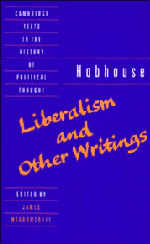Book contents
- Frontmatter
- Contents
- Acknowledgements
- Introduction
- Principal events in the life of L. T. Hobhouse
- Further reading
- Biographical notes
- Liberalism
- Chapter I Before Liberalism
- Chapter II The Elements of Liberalism
- Chapter III The Movement of Theory
- Chapter IV ‘Laissez-faire’
- Chapter V Gladstone and Mill
- Chapter VI The Heart of Liberalism
- Chapter VII The State and the Individual
- Chapter VIII Economic Liberalism
- Chapter IX The Future of Liberalism
- Other Writings
- Index
- Title in the series
Chapter I - Before Liberalism
Published online by Cambridge University Press: 05 June 2012
- Frontmatter
- Contents
- Acknowledgements
- Introduction
- Principal events in the life of L. T. Hobhouse
- Further reading
- Biographical notes
- Liberalism
- Chapter I Before Liberalism
- Chapter II The Elements of Liberalism
- Chapter III The Movement of Theory
- Chapter IV ‘Laissez-faire’
- Chapter V Gladstone and Mill
- Chapter VI The Heart of Liberalism
- Chapter VII The State and the Individual
- Chapter VIII Economic Liberalism
- Chapter IX The Future of Liberalism
- Other Writings
- Index
- Title in the series
Summary
The modern State is the distinctive product of a unique civilization. But it is a product which is still in the making, and a part of the process is a struggle between new and old principles of social order. To understand the new, which is our main purpose, we must first cast a glance at the old. We must understand what the social structure was, which – mainly, as I shall show, under the inspiration of Liberal ideas – is slowly but surely giving place to the new fabric of the civic State. The older structure itself was by no means primitive. What is truly primitive is very hard to say. But one thing is pretty clear. At all times men have lived in societies, and ties of kinship and of simple neighbourhood underlie every form of social organization. In the simplest societies it seems probable that these ties – reinforced and extended, perhaps, by religious or other beliefs – are the only ones that seriously count. It is certain that of the warp of descent and the woof of intermarriage there is woven a tissue out of which small and rude but close and compact communities are formed. But the ties of kinship and neighbourhood are effective only within narrow limits. While the local group, the clan, or the village community are often the centres of vigorous life, the larger aggregate of the Tribe seldom attains true social and political unity unless it rests upon a military organization.
- Type
- Chapter
- Information
- Hobhouse: Liberalism and Other Writings , pp. 3 - 9Publisher: Cambridge University PressPrint publication year: 1994
- 1
- Cited by



